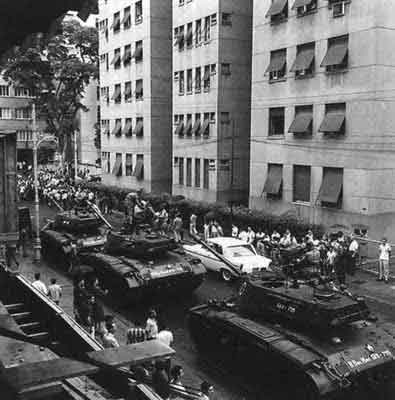On March 31, the generals took over, with US support and plans for further action if necessary "to assure success of takeover." The Generals had carried out a "democratic rebellion," Gordon cabled Washington.

Tanks on city street during
the second day of the coup
The revolution was "a great victory for the free world," which prevented a "total loss to the West of all South American Republics" and should "create a greatly improved climate for private investments." "The principal purpose for the Brazilian revolution," he testified before Congress two years later, "was to preserve and not destroy Brazil's democracy." This democratic revolution was "the single most decisive victory of freedom in the mid-twentieth century," Gordon held, "one of the major turning points in world history" in this period. Adolf Berle agreed that Goulart was a Castro clone who had to be removed.
Secretary of State Dean Rusk justified US recognition for the coup regime on the grounds that "the succession there occurred as foreseen by the Constitution," a statement that was not "entirely accurate," Thomas Skidmore judiciously observes.
US labor leaders demanded their proper share of the credit for the violent overthrow of the parliamentary regime, while the new government proceeded to crush the labor movement and to subordinate poor and working people to the overriding needs of business interests, primarily foreign, reducing real wages by 25 percent within 3 years and redistributing income "toward upper-income groups who were destined to be the great consumers of the Brazilian miracle" (Sylvia Ann Hewlett, who sees the brutal repression and attack on living standards as "an essential prerequisite for a new cycle of capitalist growth within the Brazilian domestic economy"). Washington and the investment community were naturally delighted. As the relics of constitutional rule faded away and the investment climate improved, the World Bank offered its first loans in 15 years and US aid rapidly increased along with torture, murder, starvation, disease, infant mortality—and profits.
The CIA's extensive propaganda campaign against President Joao Goulart culminated in a U.S.-backed military coup toppling the three-year-old left-wing government. Paulo Freire, who uses literacy programs to "conscientize" the poor, is imprisoned, then exiled. General Costa e Silva, the newly installed head-of-state, allows the CIA to establish an irregular political police apparatus which serves as the prototype for the U.S. "Office of Public Safety" (OPS), the mechanism through which Latin American death squads are created on a wholesale basis later in the decade. In November, 200 are jailed in Rio Grande do Sul for allegedly plotting leftist insurrection in conjunction with ousted Goias Governor Borges and ex-deputy Leonel Brizzola.